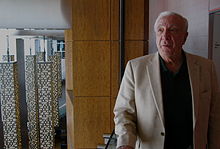John L. Casti
John Louis Casti (* 1943 in Portland , Oregon ) is an American mathematician.
Life
Casti studied mathematics and received his PhD from the University of Southern California in 1970.
He worked for RAND Corporation and the University of Arizona before joining the research staff at the International Institute for Applied Systems Analysis in Vienna in 1974 . Since 1986 Casti has been Professor of Operations Research and Systems Theory at the Institute for Econometrics, Operations Research and Systems Theory at the Vienna University of Technology .
He became internationally known in 1996 with his work "The Big Five - Mathematical Theories That Shaped Our Century". His work "The Cambridge Quintet" with scientific speculations sparked a worldwide discussion in 2000. In 2002 and 2004 he was convicted of plagiarism, and a book and an article in a specialist journal were withdrawn from him as a result.
Works
- Complexity, Language, and Life. Mathematical Approaches. (Co-editor) 1986.
- Newton to Aristotle. Toward a Theory of Models for Living Systems. (Co-editor) 1989.
- Paradigms lost. Images of man in the mirror of science. Harpner Perennial 1990. German: Loss of truth. Disputes in the natural sciences. Munich 1990. as paperback: Loss of Truth. Natural science under discussion. Munich 1992.
- The big five. Mathematical theories that shaped our century. 1996.
- The Cambridge Quintet. Heyne, Munich 2000, ISBN 3-453-16061-4 .
- Scenarios of the future. What scientists can know about the future. 2001.
- Mood Matters: From Rising Skirt Lengths to the Collapse of World Powers. 2010, ISBN 978-3-642-04834-0 .
- The Sudden Collapse of Everything: How Extreme Events Can Destroy Our Future. 2012, ISBN 978-3-492-05549-9 .
Web links
- Literature by and about John L. Casti in the catalog of the German National Library
Individual evidence
- ^ Edward Rothstein: Plagiarism that Doesn't Add Up. In: The New York Times. March 9, 2002. (www.nytimes.com)
- ^ John Casti: Losing games for your winning play. In: Wiley Online Library. October 25, 2001. (onlinelibrary.wiley.com)
| personal data | |
|---|---|
| SURNAME | Casti, John L. |
| ALTERNATIVE NAMES | Casti, John Louis |
| BRIEF DESCRIPTION | American mathematician |
| DATE OF BIRTH | 1943 |
| PLACE OF BIRTH | Portland, Oregon |
